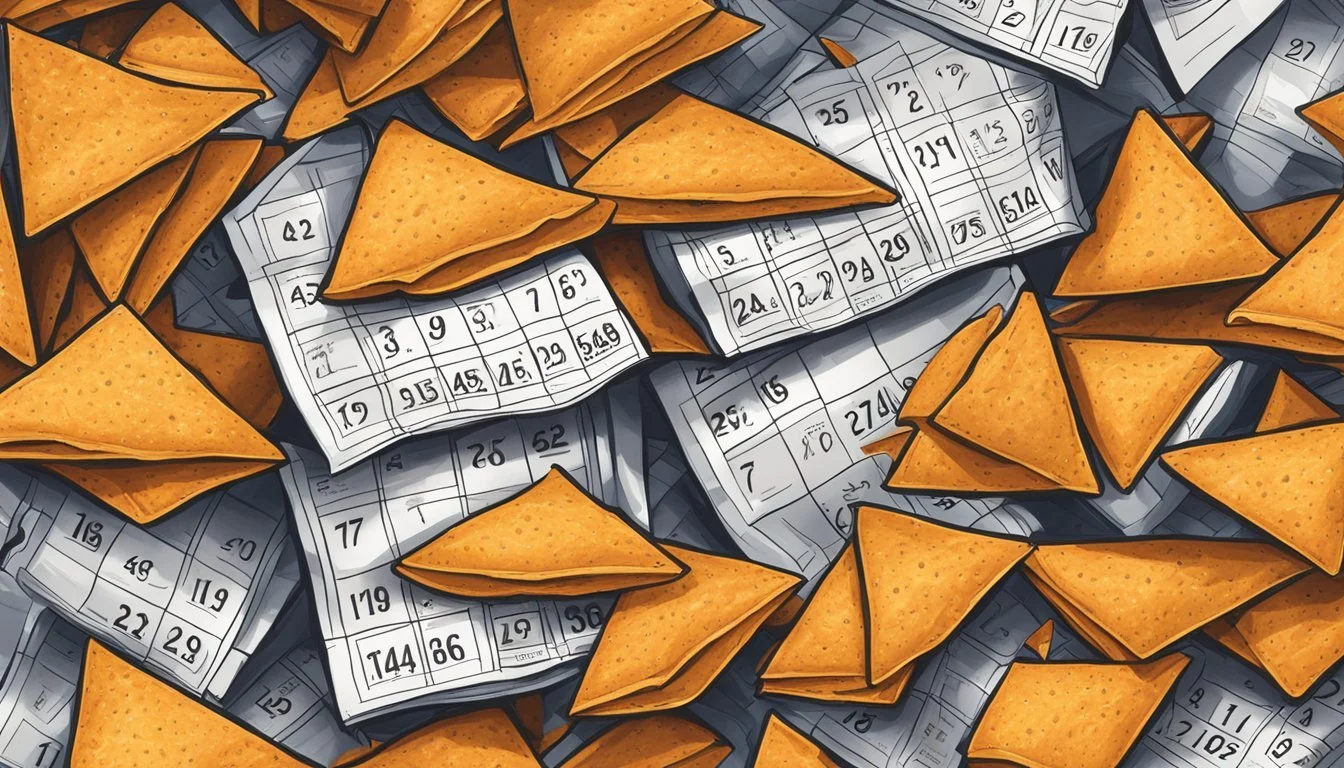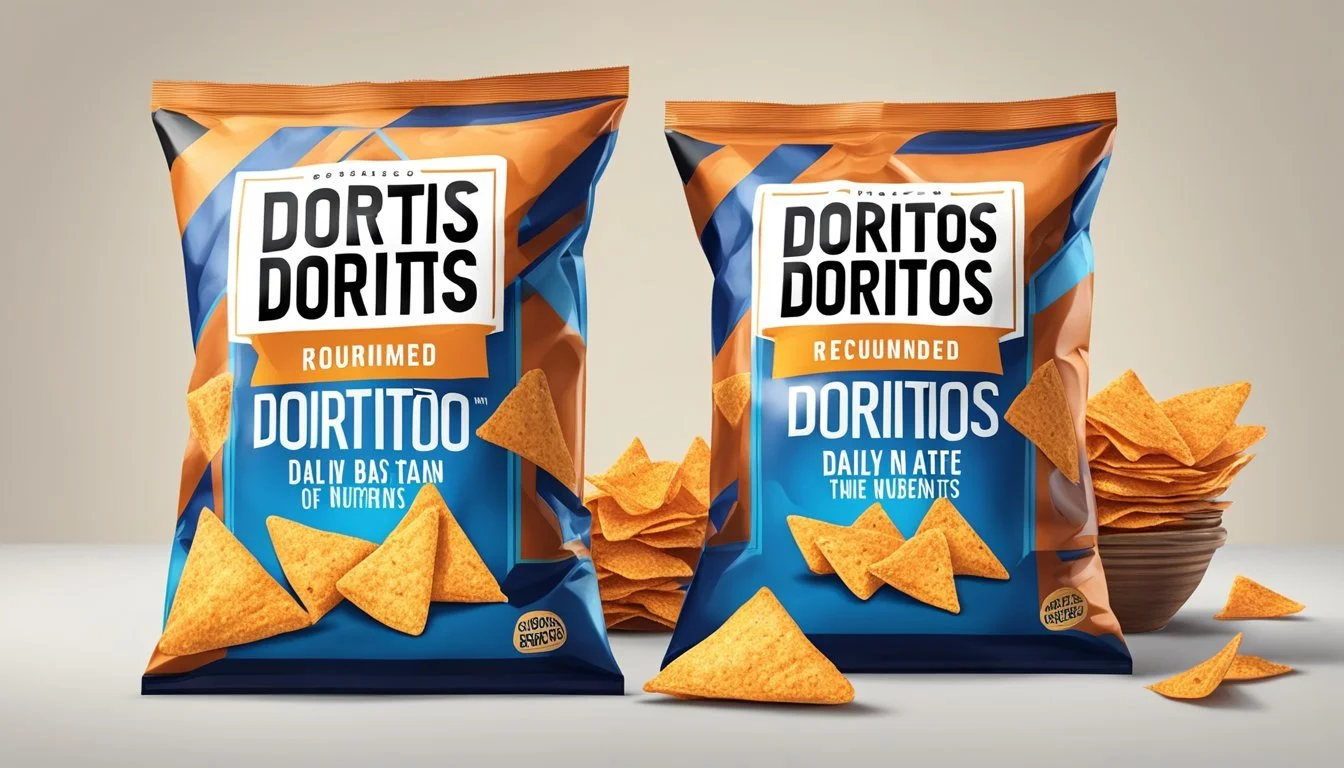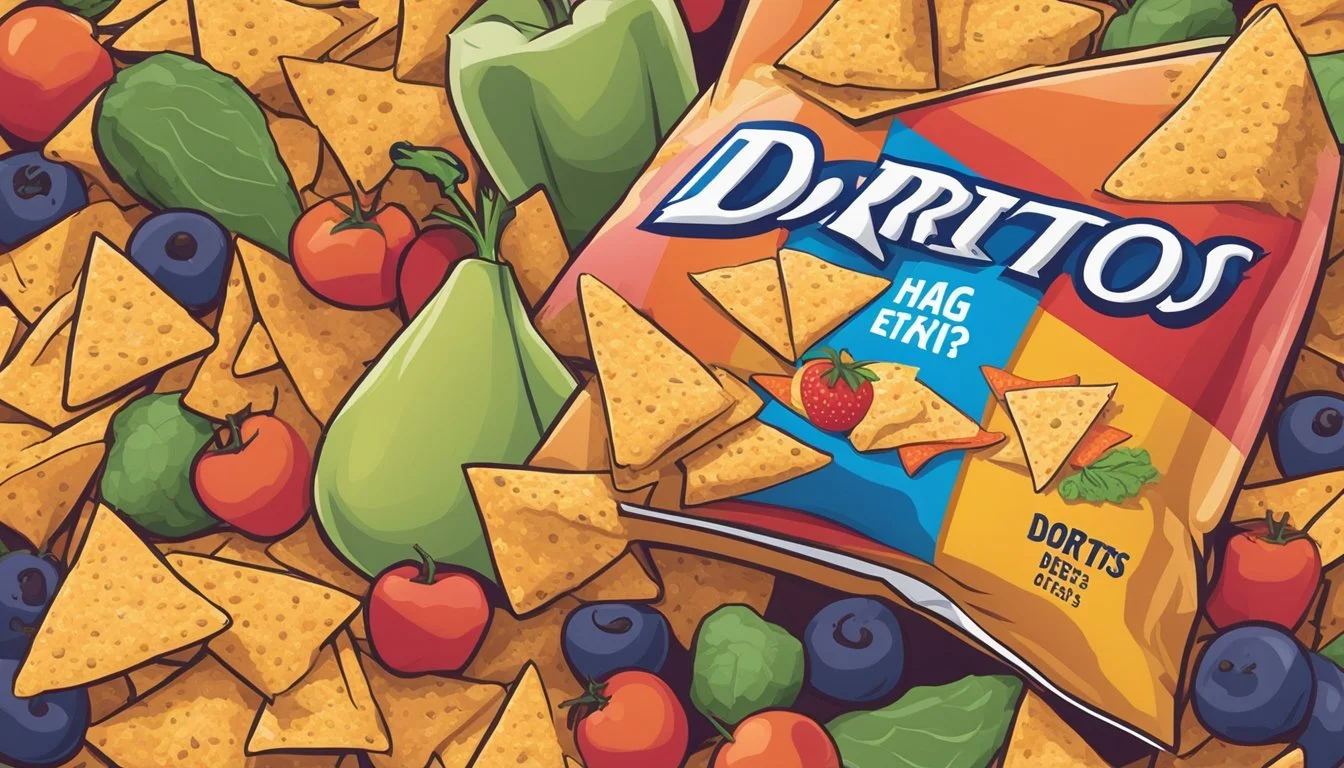How Many Servings of Doritos Per Day Is Excessive for a Balanced Diet?
Doritos, a popular brand of flavored tortilla chips, often become the snack of choice for people looking for a savory treat. While they are a tasty option for a snack, understanding the nutritional content is important for maintaining a healthy diet. The typical serving size of Doritos is about 1 ounce, or roughly 12 chips, which provides an average of 140 calories and 8 grams of fat according to the nutritional information provided by Frito-Lay, the manufacturer of Doritos.
Daily consumption of snacks like Doritos should be considered within the context of an individual's overall dietary needs and the nutritional guidelines suggested by health organizations. For instance, the U.S. Food and Drug Administration (FDA) recommends keeping sodium intake to less than 2,300 milligrams per day for healthy adults, and Doritos can contain between 180-250 milligrams of sodium per serving depending on the flavor. Moderation is key, and one must be mindful of the cumulative effect of snacking on such foods throughout the day.
Determining how many servings of Doritos per day is too much can vary depending on one's diet, but it is universally agreed that they should be eaten in moderation. Overindulging in foods high in sodium and saturated fats can contribute to various health issues, including heart disease and high blood pressure. Consumers are encouraged to read nutritional labels carefully and to integrate such snacks into a balanced and varied diet.
Understanding Servings and Portion Sizes
In discussing optimal consumption, it is essential to differentiate between 'serving size' on nutrition labels and the 'portion' one actually consumes. Serving sizes are standardized units found on packaging to help consumers make informed dietary choices, while portions are the actual amounts eaten at a single sitting.
Defining 'Serving Size'
A serving size is a standardized amount of food that assists in understanding the nutritional content detailed on the Nutrition Facts label. For example, the serving size for Doritos is typically 1 ounce or approximately 11 chips. This measure aids individuals in tracking their intake against dietary guidelines.
Misconceptions About Portion Sizes
Portion sizes, the amount one chooses to eat, often exceed the standardized serving sizes, a phenomenon known as portion distortion. This discrepancy can lead to consuming more calories than intended, potentially impacting one's dietary goals. Consequently, understanding and adhering to recommended serving sizes from various food groups is crucial for maintaining a balanced diet.
Serving Size Chart for Common Foods
Below is a chart indicating serving sizes for common foods, which might differ from the portions one typically consumes:
Food Group Standard Serving Size Grains 1 slice of bread or 1/3 cup cooked rice Fruits 1 small fruit or 8 fluid oz. of 100% fruit juice Dairy 1 cup of milk or 2 oz. of cheese Snack Foods 1 oz. (around 11 chips) for Doritos
The table should serve as a guide to compare against the portions one might serve themselves. This awarenes can help manage one's overall food intake within the desired nutritional boundaries.
Nutritional Information of Doritos
When considering Doritos as part of their diet, consumers should examine the calorie content and nutritional breakdown, as well as the sodium and fat levels found in its various flavors.
Calorie Content and Nutrient Breakdown
Doritos, a popular brand of flavored tortilla chips, come in a variety of flavors. A typical serving size is about 1 ounce (28 grams), or roughly 12 chips. This serving size generally contains:
Calories: 150
Total Fat: 8 grams
Saturated Fat: 1 gram
Trans Fat: 0 grams
Sodium: 210 milligrams
Carbohydrates: 18 grams
Dietary Fiber: 1 gram
Sugars: Less than 1 gram
Protein: 2 grams
Sodium and Fat Levels in Different Flavors
The sodium and fat content can vary slightly between different flavors of Doritos. For instance:
Nacho Cheese Flavor:
Sodium: around 210 milligrams per serving
Total Fat: 8 grams per serving
Cool Ranch Flavor:
Sodium: Content may be comparable to Nacho Cheese
Total Fat: Information suggests it would be similar to Nacho Cheese as well
Spicy Sweet Chili Flavor (content not provided in search results, so typical values for Doritos are assumed):
Sodium: Likely to be in the same range as other flavors
Total Fat: Presumably close to 8 grams per serving, following the trend of other flavors
Consumers should be aware that a diet high in sodium can lead to increased blood pressure and other health issues. Additionally, the fat content, particularly saturated fats, is also an important consideration for overall health when consuming snacks like Doritos.
Recommended Daily Intake of Major Nutrients
This section outlines the vital roles that nutrients play in maintaining health and provides the recommended guidelines for daily intake as established by leading health organizations.
Importance of Balanced Nutrients
Nutrients such as proteins, carbohydrates, and fats are essential for maintaining cell structure and energy. Proteins are crucial for tissue repair and immune function, with an average adult requiring about 50 grams per day. Carbohydrates provide the primary energy supply for the body's functions, and it is recommended that they make up 45-65% of daily caloric intake. Fiber, a type of carbohydrate, is important for digestive health; women should aim for 25 grams per day, while men should aim for 38 grams. Fats, particularly unsaturated fats, are important for brain health and energy, with the dietary pattern including less than 10% saturated fats per day.
Guidelines by Health Organizations
The American Heart Association promotes a healthy dietary pattern that includes a variety of nutrients like calcium and potassium, which support muscle function and vascular health. It is suggested that minerals like iron are crucial for transporting oxygen in the blood. Adults are advised to consume 1,000-1,200 mg of calcium per day and around 4,700 mg of potassium. Vitamin C is another essential nutrient for immune function and skin health, with a daily recommendation of 75 mg for women and 90 mg for men. These guidelines generally align with a daily diet of 2,000 calories per day, which can vary based on age, sex, weight, and physical activity level. Following these guidelines contributes to a well-rounded, healthy dietary pattern conducive to overall well-being.
Assessing Personal Dietary Needs
When determining the appropriate serving size of a snack like Doritos, one must take into account individual calorie needs, which vary based on factors such as activity level and physiological considerations like age and health conditions.
Determining Calorie Needs Based on Activity Level
An individual's daily calorie needs are greatly influenced by their activity level. For instance, a sedentary person has lower energy requirements compared to someone who is highly active. Physical activity increases overall energy expenditure, which in turn can allow for greater energy intake while maintaining a healthy body weight. Here's a simple guide to help you estimate:
Sedentary: basic daily living activities only
Moderately active: includes physical activity equivalent to walking 1.5 to 3 miles a day
Active: involves physical activity equivalent to walking more than 3 miles a day at a brisk pace
Activity Level Men (Calories per day) Women (Calories per day) Sedentary 2,000-2,400 1,600-1,800 Moderately Active 2,200-2,800 1,800-2,000 Active 2,400-3,000 2,000-2,400
One should adjust their snack servings accordingly so as not to exceed their daily caloric limit based on their activity level.
Adjusting Servings According to Age and Health
Age and health conditions also play significant roles in determining how much a person should consume. Children and teenagers require more calories due to growth, while older adults may need fewer calories due to a naturally slower metabolism. Also, someone with specific health conditions, like high blood pressure, may need to limit intake of foods high in sodium, as recommended sodium intake for those individuals is typically around 1,500 mg/day.
For example, according to the provided information, a serving of Nacho Cheese Doritos contains approximately 8 grams of fat and 210 milligrams of sodium. One must be especially careful with snack foods like Doritos, ensuring that the servings do not lead to the consumption of an excess amount of these nutrients which could contribute to health issues. Younger, active individuals may incorporate more servings within a balanced diet compared to older, sedentary ones who might need less.
Components of a Healthy Diet
A healthy diet is rooted in the balance and quality of foods consumed. It should include a variety of food groups and limit processed items and added sugars, focusing on whole foods for optimal nutrient intake.
Whole Foods vs. Processed Foods
Whole foods, such as vegetables, fruits, nuts, seeds, beans, legumes, and whole grains, should form the foundation of a nutritious diet. These foods are minimally processed and contain more of the naturally occurring nutrients and fiber that the body needs. In contrast, processed foods tend to have higher levels of sodium, added sugars, and unhealthy fats, which can be detrimental to health when consumed in large quantities.
Whole Foods: Include a variety of colors and types of vegetables and fruits, and incorporate nuts and seeds for healthy fats.
Processed Foods: Limit consumption and watch for added sugars and sodium, especially in snacks like chips and pre-packaged meals.
Incorporating Diverse Food Groups
A diverse diet includes protein foods such as poultry, seafood, and red meat in moderation, along with fat-free or low-fat dairy products or nondairy alternatives like nut, grain, or soy-based milks. The inclusion of non-tropical plant oils, rather than tropical oils or animal fats, is recommended. Such diversity ensures a range of essential vitamins, minerals, and macronutrients.
Proteins: Balance intake between animal sources and plant-based options like beans and legumes.
Dairy and Alternatives: Opt for low-fat or fat-free options or explore almond, soy, or oat milks.
Fats: Choose sources like olive and canola oils over partially hydrogenated fats.
Moderation in Snacking
Moderation is key when it comes to snacking. Occasional snacks like Doritos should be consumed in limited quantities, being mindful of the fat, particularly saturated fat, and sodium content. Aim to eat healthy most of the time, and treat snacks high in added sugars, sodium, or unhealthy fats as occasional indulgences rather than dietary staples.
Healthy Snacking: Prefer whole food snacks like a fruit or a handful of nuts over packaged snacks.
Moderation: Limit servings of high-sodium and high-fat snacks, recognizing they are treats, not regular diet components.
Risks of Excessive Snack Consumption
Excessive consumption of snacks like Doritos can lead to a series of health issues, primarily due to their high sodium and calorie content. These snacks often lack essential nutrients, contributing to the risk of various health conditions.
Link to High Blood Pressure and Other Health Issues
Consuming snacks that are high in sodium increases the risk of high blood pressure, which is a leading factor for heart disease and stroke. Doritos and similar snacks can contribute significantly to one's daily sodium intake. It's important to note that the American Heart Association (AHA) recommends no more than 2,300 milligrams a day, moving toward an ideal limit of 1,500 mg per day for most adults.
Recommended daily sodium intake:
Ideal limit: 1,500 mg
Upper limit: 2,300 mg
Frequent intake of high-calorie, nutrient-poor snacks may also lead to other health issues such as obesity, type 2 diabetes, and metabolic syndrome. Such snacks often contain trans fats from liquid oils that can negatively affect cholesterol levels.
Understanding 'Empty Calories' and Unhealthy Fats
Snacking on products like Doritos contributes to the intake of empty calories—calories from added sugars and solid fats that offer minimal to no nutritional value. A single serving of Doritos is high in calories and predominantly provides energy from fats that are not beneficial for one's health.
The health conditions associated with a diet high in empty calories and unhealthy fats include nutrient deficiencies since these foods may displace healthier options rich in essential vitamins and minerals like magnesium, calcium, potassium, and vitamin D. Here's a snapshot of what essential nutrients these snacks typically lack:
Lacking essential nutrients:
Magnesium: Crucial for regulating muscle and nerve function.
Calcium: Essential for bone health.
Potassium: Helps regulate fluid balance and blood pressure.
Vitamin D: Important for calcium absorption and bone health.
To summarize, excessive snacking on foods like Doritos can lead to increased sodium intake, high blood pressure, the intake of empty calories, and a diet lacking essential nutrients, which collectively heighten the risk of various adverse health issues.
Healthier Snack Alternatives
When seeking to limit Doritos consumption, it’s crucial to explore snacks that offer nutritional advantages, such as higher fiber or protein content. Replacing Doritos with certain snacks can contribute to a more balanced diet.
Choosing Snacks with Nutritional Benefits
Air-popped popcorn is an exemplary choice renowned for its low calorie and high fiber content, making it an excellent alternative to Doritos. Preparing popcorn without adding excessive butter or salt preserves its health profile. Nuts and seeds, while denser in calories, supply a healthy dose of protein, beneficial fats, and fiber. They also offer antioxidants—a protective compound not found in Doritos.
Top Nutritional Snack Choices:
Air-popped Popcorn: High in fiber, low in calories
Nuts and Seeds: Good source of protein, healthy fats, and antioxidants
Comparing Doritos to Other Snacks
In comparison to other common snacks, Doritos fall short nutritionally. Potato chips, similar to Doritos, tend to be high in sodium and unhealthy fats. A smarter choice might be whole food snacks like fresh fruits and vegetables, which are packed with fiber, essential vitamins, and antioxidants without the excessive sodium and calories.
On the other hand, legumes such as peas, lentils, and beans made into snacks—like bean chips—offer both protein and fiber, surpassing Doritos in terms of nutritional value. When it comes to choosing juices, one should opt for 100% juice varieties as these are more likely to contain the natural nutrients of fruit without added sweeteners.
Snack Comparison Chart:
Snack Type Benefits Considerations Potato Chips Convenient High in sodium and unhealthy fats Fresh Fruits Fiber, Vitamins - Vegetables Fiber, Nutrients - Legumes-based snacks High in protein and fiber More filling and nutritious 100% Juice Natural Nutrients Watch for calorie content Sweetened Juice Flavorful Added sugars, lower nutritional value
Consumer Tips and Support
Understanding the specifics of Doritos' nutrition and serving sizes equips consumers with the knowledge to manage their snack intake effectively.
Deciphering Nutrition Labels
Nutrition facts labels on packages of Doritos provide essential information for consumers who are monitoring their daily intake. A single serving of Doritos typically contains 150 calories, with around 8 grams of fat and 210 milligrams of sodium. When evaluating how many servings of Doritos one should consume, it's vital to consider not just calories but also macro and micronutrients:
Calories: Keep track of the total calorie count if you're managing caloric intake.
Serving Size: One bag may contain multiple servings, so check the serving size to avoid overconsumption.
Fat: Look for the amount of saturated and trans fats, aiming to limit intake of these types of fats.
Questions for FAQ Sections
Consumer support often comes in the form of Frequently Asked Questions (FAQ) sections on websites or product packaging. Here are some specific questions one could ask for more clarity:
What is the recommended serving size of Doritos?
A single serving is typically about 1 ounce (28 grams), which equates to about 12 chips.
How many calories are there in one serving?
There are approximately 150 calories in a single serving of Doritos Nacho Cheese flavor.
Where can I find nutrition information for different flavors?
The nutrition facts label on the back of the package lists detailed information for that specific flavor.
Summary and Recommendations
When considering daily servings of Doritos, moderation is key. A single serving size is traditionally about 28 grams, or roughly 12 chips, which contains approximately 140-150 calories and 8 grams of fat.
Consumers should be mindful of portion control, as it can be easy to exceed this serving size. For most adults, one serving of Doritos would suffice to satisfy cravings without significantly impacting a healthy dietary pattern.
In terms of nutrition, it's important to take into account the sodium content. Doritos contain about 210 milligrams of sodium per serving. The U.S. Food and Drug Administration recommends less than 2,200 mg of sodium per day, so keeping track of intake is important for maintaining proper health.
To incorporate Doritos into a balanced diet, consider the following points:
Limit to one serving: This helps manage calorie and fat intake.
Combine with healthy options: Pair a serving with a piece of fruit or a vegetable to improve overall nutrition.
Be activity-conscious: Engaging in regular physical activity can help balance out the calorie intake from snacks.
Here is a quick reference guide for Doritos consumption:
Factor Recommendation Serving Size About 12 chips (28 grams) Daily Servings Limit to one serving Sodium Content Monitor as part of the daily sodium intake Physical Activity Pair snack consumption with active lifestyle
Heeding these recommendations can help individuals include Doritos in their diet without compromising their health goals.








